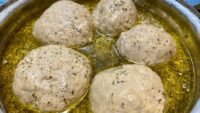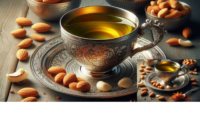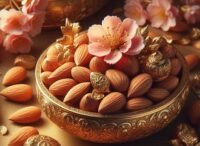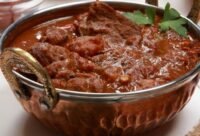Kashmiri cuisine is a treasure trove of flavors, aromas, and traditions, deeply rooted in its rich cultural heritage. Among its most celebrated dishes is Gushtaba, a royal delicacy that holds a place of pride in the traditional Kashmiri feast known as Wazwan. Often referred to as the Dish of kings, Gushtaba is a true testament to the culinary brilliance of Kashmir.
What is Gushtaba Dish?
Gushtaba is a dish made of finely pounded mutton meatballs, cooked in a rich and aromatic yogurt-based gravy. The preparation of Gushtaba is considered an art and is typically reserved for grand occasions, such as in Kashmiri weddings and festivals. It is traditionally served as the final dish in the elaborate multi-course Wazwan, symbolizing a royal farewell to the guests.
Authentic Kashmiri Gushtaba Recipe
Preparing Gushtaba requires skill, patience, and expertise, particularly in the pounding of the mutton. Here’s a breakdown of how this exquisite dish is made:
1. Selection and Preparation of Meat:
The best quality lamb or mutton is chosen, and all bones and sinews are removed. The meat is then pounded on a stone slab (locally known as ‘Maz Takri’) using a wooden mallet until it turns into a smooth, fine paste.
2. Mixing of Spices and Fat:
The minced meat is carefully blended with a mixture of spices, including fennel, ginger, cardamom, and a small amount of lamb fat. The fat is essential as it helps bind the meatballs and enhances their rich, velvety texture.
3. Shaping the Meatballs:
Once the mixture reaches the right consistency, it is shaped into large, smooth meatballs, ensuring there are no cracks.
4. Cooking in Yakhni Gravy:
The meatballs are gently simmered in a special yogurt-based gravy called ‘Yakhni’. This gravy is prepared using beaten yogurt, infused with aromatic spices like bay leaves, cloves, cinnamon, and cardamom. Slow cooking is key to allowing the flavors to meld perfectly.
The Role of Gushtaba in Kashmiri Wazwan
In a traditional Wazwan, Gushtaba is the concluding dish, served right before the guests finish their meal. It is considered a mark of hospitality and is regarded as a culinary masterpiece. Kashmiri chefs, known as ‘Wazas’, take immense pride in preparing it, ensuring that every bite is a celebration of taste and texture.
Why is Gushtaba So Special?
- Symbol of Royalty – Gushtaba was historically served to kings and nobles in Kashmir, and to this day, it remains an elite dish.
- Culinary Craftsmanship – The delicate pounding and slow cooking techniques highlight the expertise of Kashmiri Wazas.
- Rich, Creamy Flavor – The tangy yogurt-based Yakhni perfectly balances the richness of the meatballs.
- Tradition and Heritage – Every bite carries the legacy of Kashmiri culture and hospitality.
Gushtaba is more than just a dish; it is an experience that embodies the heart and soul of Kashmir’s culinary tradition. Whether enjoyed in a grand Wazwan feast or prepared at home for a special occasion, Gushtaba continues to be a cherished symbol of Kashmiri hospitality, flavor, and artistry.

kashmiri Gushtaba Recipe And Ingredients

Kashmiri Kahwa-A Sip of Tradition, Health, and Flavor

Kashmiri Apricots And Their Remarkable Benefits

Kashmiri Almonds -The Secret Superfood From The Himalayas

The World of Kashmiri Saffron – Benefits And Where To Buy The Real Deal



